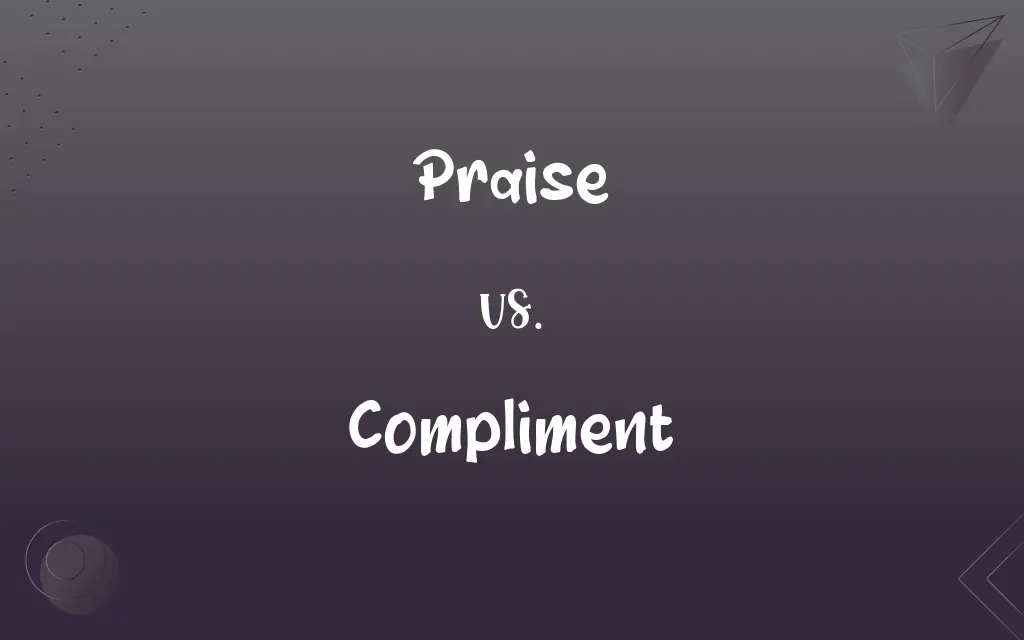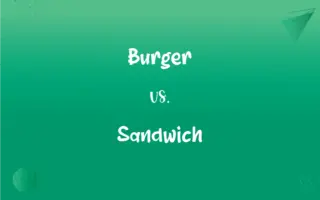Praise vs. Compliment: What's the Difference?
Edited by Harlon Moss || By Janet White || Published on December 1, 2023
Praise is the expression of approval or admiration for someone's achievements or qualities, while a compliment is a polite expression of praise or admiration, often about someone's appearance or a specific attribute.

Key Differences
Praise typically focuses on someone's achievements, abilities, or character, often in a more formal or serious context. Compliments are generally about specific attributes, like appearance or a particular skill, and are often more casual.
Praise tends to be more detailed and substantive, acknowledging significant accomplishments or qualities. Compliments are usually brief and can be about relatively superficial qualities.
Praise is often used in professional or educational settings to acknowledge achievements or improvements. Compliments are common in social interactions, focusing on making the recipient feel good about something specific.
Praise carries a deeper emotional weight, as it often recognizes effort or talent. Compliments, while positive, are typically lighter and can be seen as polite or courteous remarks.
Praise might be less frequent and used in more formal situations, whereas compliments can be part of everyday conversation and are more casual.
ADVERTISEMENT
Comparison Chart
Focus
Achievements, abilities, character
Specific attributes, appearance, skills
Depth
Detailed, substantive
Brief, can be superficial
Context
Professional, educational settings
Social interactions, casual conversations
Emotional Weight
Deeper recognition of effort or talent
Lighter, polite or courteous
Frequency/Formality
Less frequent, more formal
Common, casual
ADVERTISEMENT
Praise and Compliment Definitions
Praise
An expression of respect and admiration for someone.
The teacher's praise motivated the students to work harder.
Compliment
A flattering comment to show approval or appreciation.
Her cooking skills always attract compliments from guests.
Praise
Expression of approval or admiration for someone's achievements.
She received praise from her coach for her dedication.
Compliment
A courteous remark acknowledging someone's quality or achievement.
The manager paid a compliment to the team for their efficiency.
Praise
Recognition of someone's good qualities or accomplishments.
His hard work earned him high praise from his colleagues.
Compliment
A polite expression of praise or admiration.
She received a compliment on her elegant dress.
Praise
Commendation for someone's achievements or qualities.
He won widespread praise for his innovative research.
Compliment
An admiring remark about someone's appearance or attribute.
He gave her a compliment on her eloquent speech.
Praise
Acknowledgment of the value or excellence of something.
The novel received critical praise for its storytelling.
Compliment
An expression of esteem or admiration in a social context.
They exchanged compliments on each other's professionalism.
Praise
Expression of approval, commendation, or admiration.
Compliment
An expression of praise, admiration, or congratulation.
Praise
The extolling or exaltation of a deity, ruler, or hero.
Compliment
A formal act of civility, courtesy, or respect.
FAQs
How does praise differ from a compliment?
Praise often relates to achievements or actions, while compliments are usually about someone's qualities or appearance.
Can praise be harmful?
Excessive or insincere praise can be counterproductive, leading to complacency or skepticism.
How does praise affect children?
For children, praise can be a powerful motivator and tool for reinforcing good behavior and achievements.
Why is praise important?
Praise can motivate and encourage people, boosting their confidence and morale.
Why do people give compliments?
To express admiration, create a positive interaction, or acknowledge something favorable about another person.
Can compliments be about skills?
Yes, compliments can be about skills, achievements, or personal attributes.
What is praise?
Praise is expressing approval or admiration, often for an achievement or specific quality.
How should praise be delivered?
Praise should be specific, sincere, and relevant to the person's actions or achievements.
Is public praise more effective than private praise?
The effectiveness varies; some may appreciate public recognition, while others prefer private acknowledgment.
Can praise lead to improvement?
Yes, praise can inspire continued effort and development.
What is a compliment?
A compliment is a polite expression of praise or admiration, often about someone's appearance, style, or qualities.
Are compliments always positive?
Generally, yes, but they must be sincere; insincere compliments can be perceived negatively.
Can compliments be culturally sensitive?
Yes, cultural norms and sensitivities should be considered when giving compliments.
How do compliments impact relationships?
Compliments can strengthen relationships by building mutual respect and appreciation.
Is praise always verbal?
No, praise can be expressed through gestures, awards, written notes, or other forms of recognition.
Can praise be a form of feedback?
Yes, constructive praise is an effective form of positive feedback.
How can compliments affect self-esteem?
Genuine compliments can boost self-esteem and positive self-perception.
How do you respond to a compliment?
A simple “thank you” is a polite and appropriate response.
Can compliments be professional?
Absolutely, professional compliments can acknowledge a colleague's skills, achievements, or contributions.
Is it okay to compliment strangers?
Yes, but it's important to be respectful and considerate of boundaries.
About Author
Written by
Janet WhiteJanet White has been an esteemed writer and blogger for Difference Wiki. Holding a Master's degree in Science and Medical Journalism from the prestigious Boston University, she has consistently demonstrated her expertise and passion for her field. When she's not immersed in her work, Janet relishes her time exercising, delving into a good book, and cherishing moments with friends and family.
Edited by
Harlon MossHarlon is a seasoned quality moderator and accomplished content writer for Difference Wiki. An alumnus of the prestigious University of California, he earned his degree in Computer Science. Leveraging his academic background, Harlon brings a meticulous and informed perspective to his work, ensuring content accuracy and excellence.






































































